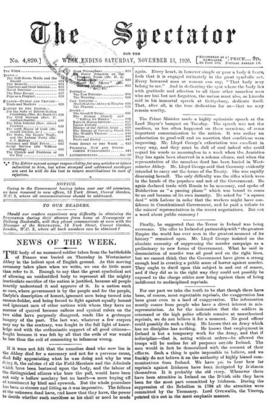For our part we take the truth to be that
though there have been, of course, most regrettable reprisals, the exaggeration has been great even in a land of exaggeration. The information mostly comes from people who have a direct interest in mis- representation. As for the insinuation that the soldiers in command or the high police officials connive at unauthorized reprisals, we do not believe it for a moment. No good officer could possibly do such a thing. He knows that an Army which has no discipline has nothing. He knows that employment in Ireland is but a temporary work for the Army, and that if indiscipline—that is, acting without orders—be allowed the troops will be useless for all purposes outside Ireland. The men would in fact be demoralized with the consent of their officers. Such a thing is quite impossible to believe, and we frankly do not believe it on the authority of highly biased cont. mimications from Ireland. We have ye L to hear how far reprisals against Irishmen have been, instigated by lishmen themselves. It is probably the old etory. Whenever there have been atrocities in Ireland on the British aide they have been for the most part committed by Irishmen. During the suppression of the Rebellion in 1798 all the atrocities were committed by the Yeomanry. Lord Cornwallis, the Viceroy, pointed this out in the most emphatio manner.






































